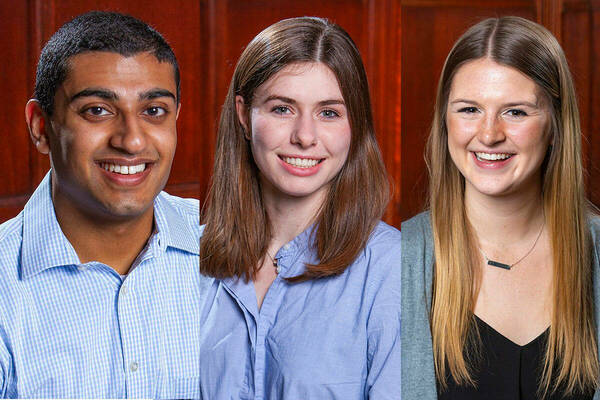
In labs, at conferences, and in public policy forums domestic and abroad, Notre Dame neuroscience and behavior majors are exploring and deepening their passion for the study of the human nervous system.
Last year, three members of the Class of 2019 used grants they received through the Glynn Family Honors Program to conduct research on meditation and neglected children, measuring stress response, and rethinking justice.
Through one discipline, they were able to see a variety of ways in which a firmer grasp of human thinking, affect, and behavior can serve as a force of good in the world.
Neuroscience and poverty studies
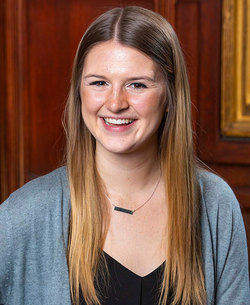 Molly Kuehn
Molly Kuehn
Molly Kuehn combined her interests in pediatrics and social justice by studying the relationship between maternal behavior and child development at Notre Dame’s William J. Shaw Center for Children and Families, where she had worked as a research assistant since her freshman year.
Having previously studied the detrimental effects of different forms of maltreatment on children, Kuehn pursued a senior thesis that would blend neuroscience and her minor in poverty studies.
She researched how conversations between mothers and their children about past experiences can help improve outcomes for neglected children in low-income families.
“The most challenging aspect of this experience was witnessing firsthand how research results do not simply appear overnight,” said Kuehn, a native of Coralville, Iowa. “Rather, the process is extensive and seemingly slow-moving. My summer taught me a lot about patience, whether in thoroughly reviewing the literature or in learning methods of statistical analysis.”
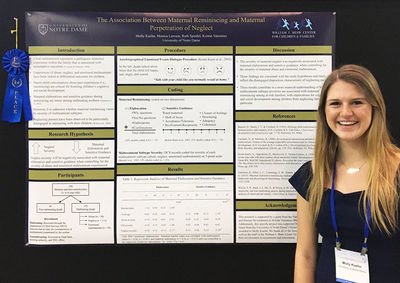 Kuehn presenting her research at a conference.
Kuehn presenting her research at a conference.
Not only did Kuehn grow both as a scholar and researcher in the lab, she also built strong relationships with her adviser, psychologist and Shaw Center director Kristin Valentino, and with colleagues at the 2019 Society for Research in Child Development biennial meeting in Baltimore, where she presented her senior thesis research.
“Having a source of support and solidarity among my peers strengthened the learning and enjoyment that I had found throughout my summer of research,” she said.
Kuehn, whose poster was one of three to receive top undergraduate honors at the SRCD conference, is now a student at Duke University School of Medicine.
Neuroscience and meditation
 Simon Padanilam
Simon Padanilam
Simon Padanilam has frequently used meditation to calm and focus himself and was interested in studying its effects on stress levels for his senior thesis.
Much of the existing research on meditation uses an electroencephalogram to record the electrical activity of the brain, but that device is costly, time-consuming, and requires a trained professional to analyze the results.
So the Aurora, Ohio, native designed a study that evaluated the ability of two other devices — the Bispectral device, which is used by anesthesiologists to monitor patient sedation levels, and the Muse, a commercial device that monitors mental and physical factors during meditation — to monitor stress and relaxation in expert and amateur meditators.
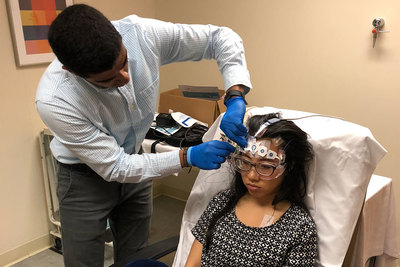 Padanilam conducting research.
Padanilam conducting research.
He conducted his study over the course of a summer at Case Western Reserve University, and used his method to show that the BIS device has potential to be a valid instrument for meditation research, but the Muse does not.
“That summer was by far the most important I have ever had in terms of personal growth and learning to be a more well-rounded person,” he said. “This experience has given me a desire to conduct research when I am a physician.”
Padanilam, who also minored in Greek and Roman civilization, is now attending the Northwestern University Feinberg School of Medicine.
Neuroscience and criminal justice
 Carly Loughran
Carly Loughran
In Boston and New York, Carly Loughran conducted research for her senior thesis on how exposure to violence during childhood affects the fear centers of the brain and predisposes a person to violent acts.
“To understand our criminal justice system, we must have an understanding of how violence exposure affects the brain,” said Loughran, who is from Oak Park, Illinois, and minored in poverty studies and philosophy, politics, and economics (PPE).
She used a Glynn research grant to visit law schools at New York University, Harvard University, and Boston University and spoke with faculty who were focused on using the legal system to achieve social change.
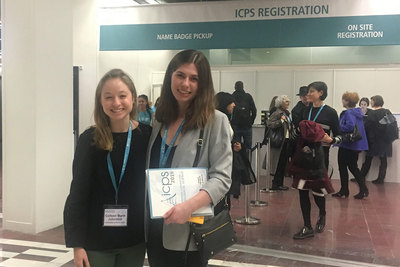 Loughran at the International Convention of Psychological Science in Paris.
Loughran at the International Convention of Psychological Science in Paris.
In February of her senior year, Loughran went to Washington, D.C., to attend a criminal justice reform event featuring politicians, policymakers, and national media.
She attended the International Convention of Psychological Science in Paris, learning how different countries approach human behavior and research, discussing everything from neuroimaging and racial identity to the role of psychology in politics.
“Listening to the keynote address, a talk that directly related to my thesis, surrounded by 2,000 other scholars was very moving,” she said.
Loughran is now attending Georgetown Law School and hopes to pursue a career in public interest law.
Originally published by at al.nd.edu on October 01, 2019.